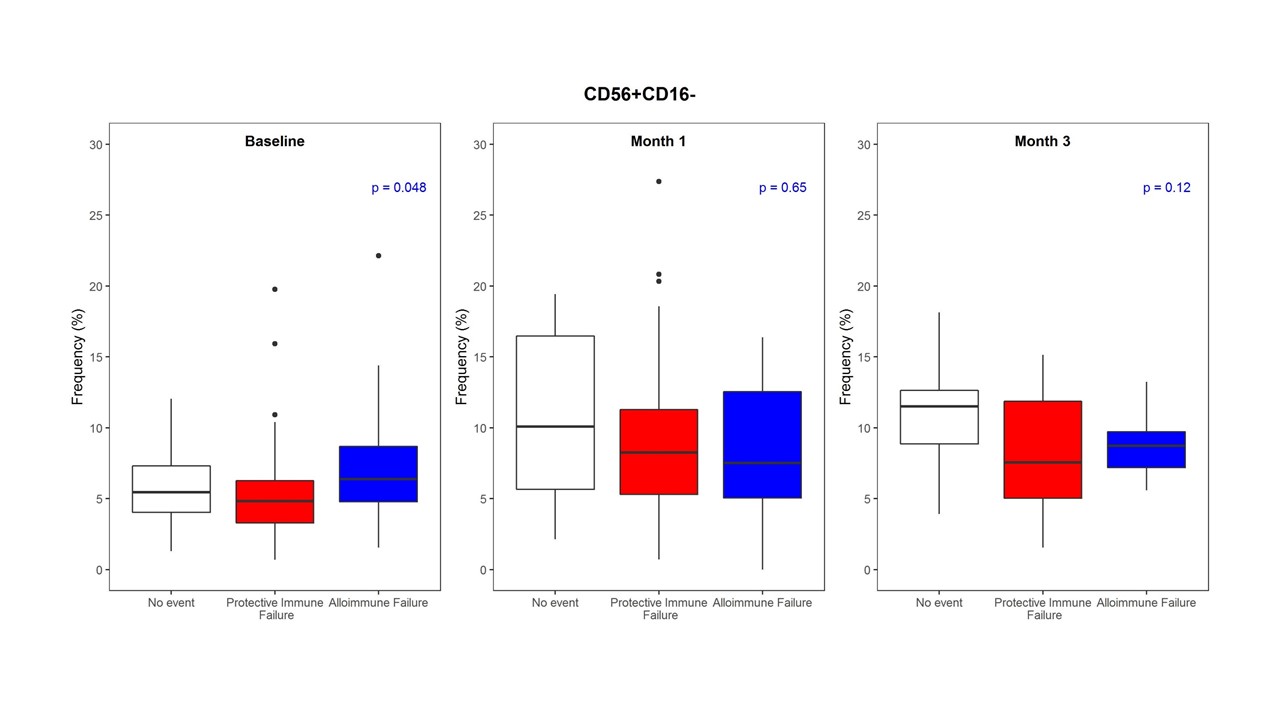NK Cells Are Associated with Alloimmune Failure in Transplanted Children
1Pediatrics, Duke University, Durham, NC, 2Surgery, Stanford, Palo Alto, CA, 3NIH, Bethesda, MD, 4Pediatrics, UCLA, Los Angeles, CA, 5Pediatrics, Stanford, Stanford, CA, 6Surgery, Duke University, Durham, NC, 7Pediatrics, UCSF, San Francisco, CA, 8Pediatrics, Emory University, Atlanta, GA
Meeting: 2019 American Transplant Congress
Abstract number: 55
Keywords: Alloantibodies, Monitoring, Pediatric, Rejection
Session Information
Session Name: Concurrent Session: Biomarkers, Immune Monitoring and Outcomes I
Session Type: Concurrent Session
Date: Sunday, June 2, 2019
Session Time: 2:30pm-4:00pm
 Presentation Time: 2:42pm-2:54pm
Presentation Time: 2:42pm-2:54pm
Location: Room 306
*Purpose: Alloimmune failure, defined as the development of donor specific antibody (DSA) and/ or allograft rejection, remains a significant complication in pediatric kidney transplantation. NK cells have been implicated, yet their role remains unclear. Therefore, we aimed to identify NK cell phenotypes that associated with alloimmune failure in transplanted children.
*Methods: 103 children (age 1-21) from the multi-center, NIH, Immune Development in Pediatric Transplantation trial were prospectively monitored for one year after kidney transplantation. Patients were classified as having no event, impaired protective immunity (defined by viremia/clinical viral infection: EBV, CMV, BK, JC, Adenovirus, or Human Herpes virus), or alloimmune failure. Multiparameter flow cytometry was monitored for NK cells defined as CD3-CD20- cells that were CD56+CD16-, CD56-CD16+ or CD56+CD16+. Biopsies were performed at 6, 12 months, and clinically indicated and graded by Banff criteria. Subdistribution hazards (SH) model was conducted to evaluate the association of baseline NK cell frequencies with patient outcomes.
*Results: Of 103 patients, 16 (15.5%) had no event, 22 (21.4%) developed alloimmune failure, and 65 (63.1%) had impaired protective immunity. CD56+CD16- cells were significantly elevated at baseline (pre-transplant) for patients with alloimmune failure (p=0.048) compared to no event and impaired protective immunity groups (Figure 1). Importantly, exceeding 1% of baseline CD56+CD16- NK cell frequency increased the risk of developing alloimmune failure by 16% during the first year post-transplantation SH ratio 1.16 95% CI: 1.02 to 1.33, p=0.03.
*Conclusions: Higher pre-transplant CD56+CD16- NK cells are associated with an increased risk of alloimmune failure within the first year post-transplantation and may help risk stratify patients to tailor immunosuppressive therapy.
To cite this abstract in AMA style:
Chambers ET, Martinez O, Robien M, Chan C, Ettenger R, Grimm P, Lee H, Reed E, Stempora L, Sarwal M, Warshaw B, Zhao C, Kirk AD. NK Cells Are Associated with Alloimmune Failure in Transplanted Children [abstract]. Am J Transplant. 2019; 19 (suppl 3). https://atcmeetingabstracts.com/abstract/nk-cells-are-associated-with-alloimmune-failure-in-transplanted-children/. Accessed February 14, 2026.« Back to 2019 American Transplant Congress

